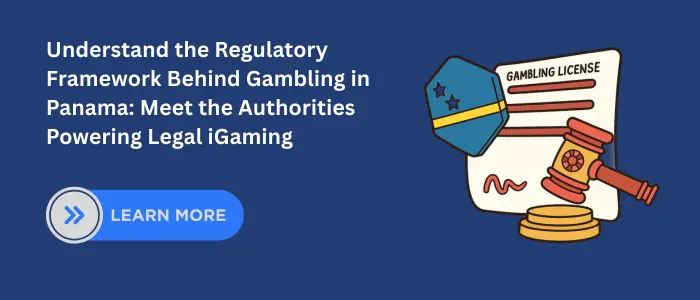Introduction
Understanding the laws and regulations that govern the gambling industry is crucial for both operators and players. In Panama, the Gaming Control Board plays a pivotal role in ensuring the integrity and fairness of the industry. The gambling regulations in Panama are designed to provide a safe and secure environment for gambling activities. These regulations are strictly enforced by the relevant authorities, helping to maintain the trust and confidence of players. If you’re planning to enter this regulated market, working with a casino game development company can ensure your platform meets compliance standards while delivering a top-tier user experience.
1. Overview of Panama's Gambling Industry

- With its liberal gaming laws and modern infrastructure, Panama has established itself as a hub for casino operations and other forms of gambling.
- The country’s strategic location and business-friendly environment have made it an attractive destination for international investors and gaming operators.
Economic Impact of Gambling in Panama
- The economic impact of the gambling industry in Panama is substantial.
- The sector generates significant revenue for the government through taxes and licensing fees, creating jobs and stimulating economic growth.
- According to recent data, the gaming industry contributes a considerable percentage to Panama’s GDP, making it a vital component of the country’s economy.
Economic Indicator Table:Economic Indicator Contribution GDP Contribution 5% Employment Rate 3% Tax Revenue $100 million
Types of Gambling Operations in Panama
- Panama’s gambling industry encompasses a wide range of gaming activities.
- Casino operations are among the most prominent, with numerous casinos operating in the country, offering a variety of games, including slots, poker, and roulette.
- Sports betting is another popular form of gambling, with many operators offering odds on various sports events.
2. Historical Development of Gambling Laws in Panama
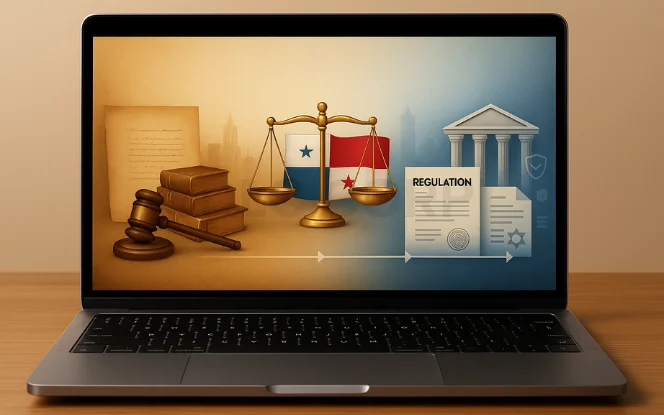
- Understanding the historical context of Panama’s gambling laws is crucial for grasping the current regulatory landscape.
- The evolution of these laws has been influenced by various factors, including economic needs and social attitudes towards gambling.
Early Gambling Legislation
- The early gambling legislation in Panama laid the groundwork for the modern regulatory framework.
- Initially, gambling was regulated through a series of laws and decrees that aimed to control the industry while generating revenue for the government.
- Key legislation from this period established the foundation for licensing and regulatory oversight.
- The first laws were relatively simple, focusing on taxation and basic operational requirements.
Evolution of Regulatory Framework
- Over time, Panama’s gambling laws have evolved to address the growing complexity of the industry.
- The regulatory framework has been strengthened and expanded to include more detailed licensing requirements, stricter compliance measures, and enhanced player protection.
- This evolution reflects Panama’s efforts to maintain a fair and transparent gambling environment while adapting to international standards and best practices.
3. Regulatory Bodies Governing Gambling in Panama
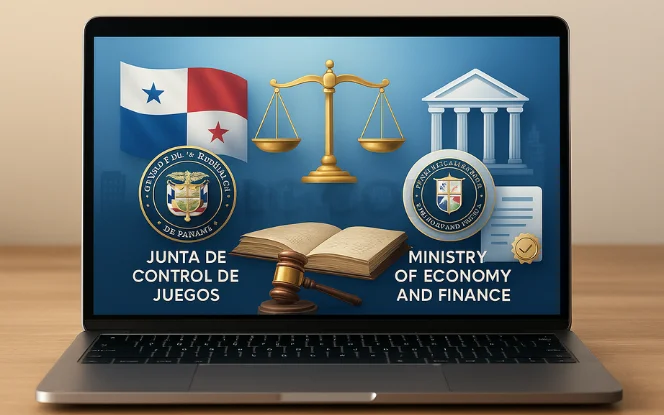
- Regulatory oversight of Panama’s gambling industry is primarily handled by two main bodies.
- The effective governance of the gambling sector is crucial for maintaining integrity, ensuring compliance with laws, and promoting a fair gaming environment.
Gaming Control Board (Junta de Control de Juegos)
- The Gaming Control Board, known locally as “Junta de Control de Juegos,” plays a pivotal role in overseeing the gambling industry.
- It is responsible for ensuring that all gambling operations comply with the established regulations and laws.
- This includes monitoring licensing requirements, enforcing gaming laws, and regulating the types of games offered to players.
- The Gaming Control Board also works to prevent illegal gambling activities and protect players by maintaining strict standards for operators.
- By doing so, it helps to foster a trustworthy gaming environment in Panama.
Ministry of Economy and Finance
- The Ministry of Economy and Finance is another crucial regulatory body that influences the gambling industry in Panama.
- While its primary role is to shape the country’s economic policies, it also has a significant impact on the gambling sector through taxation policies and revenue collection.
- The Ministry works closely with other regulatory bodies to ensure that the economic aspects of gambling are managed effectively, contributing to the country’s revenue while maintaining a balanced approach to gaming regulation.
4. The Panama Gaming Control Board Structure
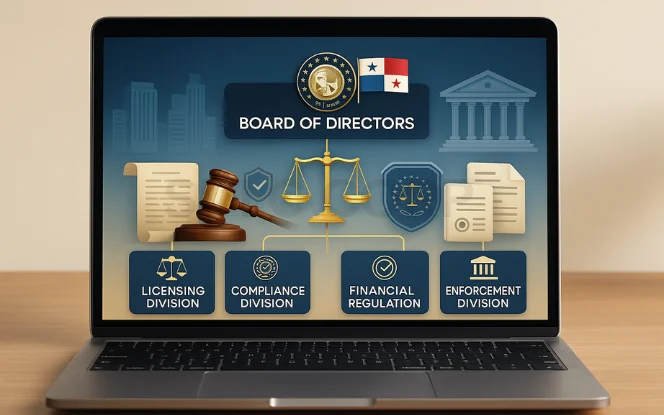
- At the heart of Panama’s gambling regulation is the Gaming Control Board, which boasts a sophisticated organizational hierarchy.
- This structure is crucial for the effective governance of the country’s gambling industry.
Organizational Hierarchy
- The Gaming Control Board operates through a well-defined organizational hierarchy.
- This includes various departments such as licensing, compliance, and enforcement, each playing a vital role in the regulatory process.
Departments and Roles:
- Licensing Department: Responsible for issuing licenses to operators.
- Compliance Department: Ensures that licensees adhere to regulatory requirements.
- Enforcement Department: Takes action against non-compliant operators.
This hierarchical structure allows the Board to manage the complex gambling landscape efficiently.
Responsibilities and Powers
- The Gaming Control Board has a broad range of responsibilities and powers that enable it to regulate the gambling industry effectively.
Key Responsibilities:
- Regulating and supervising all gambling activities.
- Issuing and revoking licenses.
- Enforcing compliance with gambling laws and regulations.
By exercising these powers, the Board ensures that the gambling industry operates fairly and transparently, protecting both players and operators.
5. Licensing Requirements for Gambling Operations
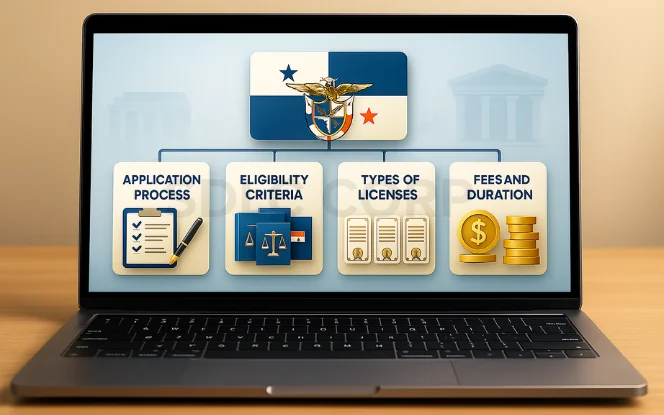
- The licensing process for gambling operations in Panama involves several key steps and requirements.
- To operate a gambling business in Panama, obtaining the appropriate license is not only mandatory but also a critical step in ensuring compliance with the country’s regulatory framework.
Application Process
- The application process for a gambling license in Panama is comprehensive and requires operators to submit detailed documentation.
- This includes business plans, financial statements, and background checks on key personnel.
- The Gaming Control Board reviews each application to ensure that the operator meets the necessary standards.
Eligibility Criteria
- To be eligible for a gambling license, operators must demonstrate financial stability, integrity, and a commitment to responsible gaming practices.
- The eligibility criteria are designed to ensure that only reputable operators are licensed to offer gambling services in Panama.
Types of Licenses Available
- Panama offers various types of gambling licenses, including those for casinos, sports betting, and online gaming.
- Each type of license has its specific requirements and restrictions, allowing operators to choose the license that best suits their business model.
Fees and Duration
- The fees associated with obtaining a gambling license in Panama vary depending on the type of license.
- Licenses are typically issued for a specific duration, after which they must be renewed.
- The fees and duration are structured to ensure that operators are committed to long-term compliance with regulatory requirements.
6. Regulation of Land-Based Casinos
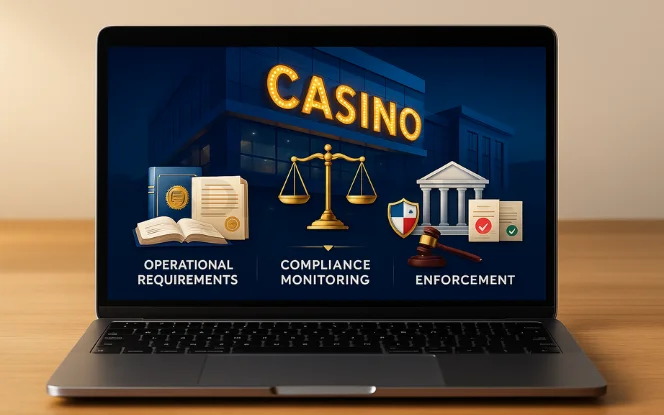
- Land-based casinos in Panama operate under a robust regulatory framework designed to ensure fairness, integrity, and transparency.
- This framework is crucial for maintaining public trust and confidence in the gaming industry.
Operational Requirements
- To operate a land-based casino in Panama, operators must meet specific operational requirements.
- These include maintaining a high level of customer service, ensuring the integrity of gaming equipment, and implementing robust security measures.
- Additionally, casinos are required to adhere to strict financial reporting standards and maintain accurate records of transactions.
- This helps in preventing financial crimes and ensures that casinos contribute appropriately to the state’s revenue.
Compliance Monitoring and Enforcement
- The regulatory bodies in Panama, particularly the Gaming Control Board, are responsible for compliance monitoring and enforcement.
- They conduct regular audits and inspections to ensure that land-based casinos comply with the operational requirements and other regulations.
- In cases of non-compliance, the regulatory bodies have the authority to impose penalties, which can range from fines to the revocation of licenses.
7. Online Gambling Regulations in Panama
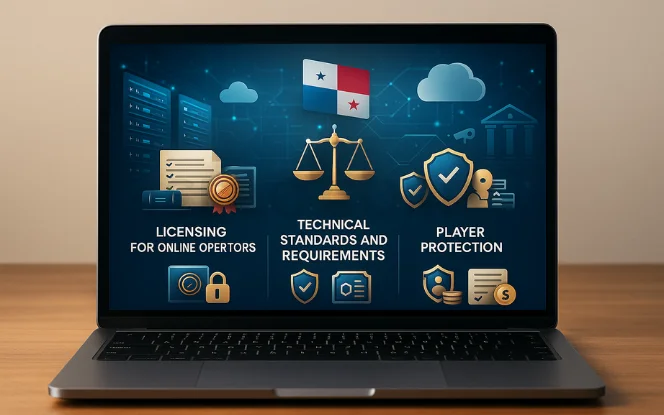
- Panama’s online gambling industry is governed by a set of regulations designed to ensure fair play and protect players.
- The regulatory framework is comprehensive, covering licensing, technical standards, and player protection measures.
Licensing for Online Operators
- To operate in Panama, online gambling operators must obtain a license from the relevant authorities.
- The licensing process involves a thorough vetting of the operator’s financial stability, integrity, and ability to provide fair gaming services.
- Licensing ensures that only reputable operators are allowed to offer their services in Panama.
Technical Standards and Requirements
- Online gambling operators in Panama are required to adhere to strict technical standards to ensure the integrity and security of their gaming platforms.
- This includes the use of random number generators (RNGs) to ensure fair outcomes and robust security measures to protect player data.
- Regular audits are conducted to ensure compliance with these standards.
Player Protection Measures
- Panama’s regulations also include measures to protect players from problem gambling and ensure that they are treated fairly by operators.
- This includes requirements for operators to:
- Provide clear information about their games
- Offer tools for players to manage their gambling
- Implement measures to prevent underage gambling
- Provide clear information about their games
8. Anti-Money Laundering Measures in Panama's Gambling Sector
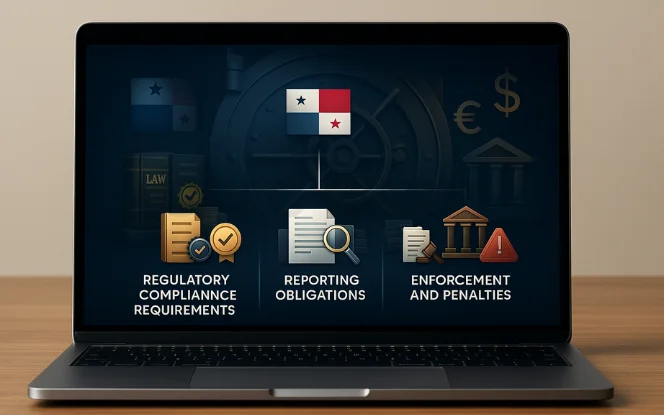
- Panama has strengthened its AML framework for the gambling industry to mitigate the risk of money laundering.
- This move is part of a broader effort to ensure the integrity of financial transactions within the sector.
Regulatory Compliance Requirements
- Operators in Panama’s gambling sector must comply with stringent AML regulations.
- These include implementing robust customer due diligence and maintaining detailed transaction records.
Reporting Obligations
- Gambling operators are required to report suspicious transactions to the relevant authorities.
- This includes filing Suspicious Transaction Reports (STRs) with the Financial Analysis Unit (UAF).
Enforcement and Penalties
Regulatory Requirement Table:
| Regulatory Requirement | Description | Consequence of Non-Compliance |
|---|---|---|
| Customer Due Diligence | Verify customer identity and assess risk | Fines and potential license suspension |
| Transaction Monitoring | Monitor transactions for suspicious activity | Penalties and reputational damage |
| Reporting Suspicious Transactions | File STRs with the UAF | License revocation and severe fines |
9. Taxation of Gambling Operations in Panama
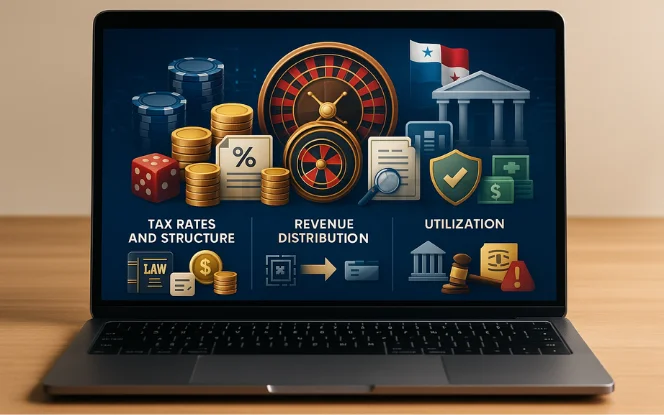
- Understanding the taxation of gambling operations in Panama is essential for both local and international operators.
- The taxation framework is designed to generate revenue for the government while ensuring the sustainability of the gambling industry.
Tax Rates and Structure
- The tax rates for gambling operations in Panama vary depending on the type of game and the operator’s license.
- Generally, the tax rate ranges from 3% to 5% of the gross gaming revenue.
- This structure is designed to be competitive with other jurisdictions while ensuring a steady stream of revenue for the government.
Revenue Distribution and Utilization
- The revenue generated from taxation is distributed across various public sectors, including education, healthcare, and infrastructure.
- This allocation ensures that the economic benefits of the gambling industry are shared across the community.
- The effective utilization of tax revenue is crucial for maintaining public support for the industry.
- According to recent data, the taxation of gambling operations has contributed significantly to Panama’s economy, highlighting the importance of a well-structured tax framework.
10. Recent Developments and Future Outlook
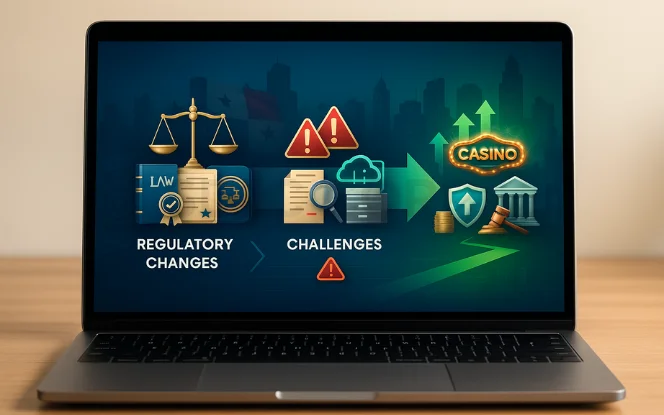
- Panama’s gambling industry is on the cusp of a new era, driven by recent developments and a shifting regulatory landscape.
- The industry’s evolution is influenced by a complex interplay of regulatory changes, technological advancements, and shifting market dynamics.
Regulatory Changes
- Recent years have seen significant updates to Panama’s gambling regulations, aimed at enhancing the industry’s integrity and competitiveness.
- Key changes include stricter licensing requirements and improved anti-money laundering measures.
- These updates have been designed to align Panama’s gambling regulations with international best practices.
- The regulatory changes have been driven by the need to address emerging challenges and capitalize on new opportunities.
- For instance, the introduction of more stringent licensing requirements has helped to ensure that only reputable operators are granted licenses.
Challenges and Opportunities
- Despite the positive developments, Panama’s gambling industry faces several challenges, including:
- Increased competition from neighboring jurisdictions
- The need to adapt to rapidly evolving technological trends
- Increased competition from neighboring jurisdictions
- However, these challenges also present opportunities for growth and innovation.
The industry’s ability to leverage technology, such as online gambling platforms, is expected to drive future growth. A comparison of the current landscape and potential future developments is illustrated in the table below.
Conclusion
Understanding the regulatory framework governing gambling in Panama is essential for operators, players, and regulatory bodies alike. The country’s gaming industry is overseen by key institutions such as the Gaming Control Board and the Ministry of Economy and Finance. These entities play a critical role in maintaining integrity across gambling operations, from issuing licenses to enforcing anti-money laundering (AML) measures. For operators seeking to build or enhance their platforms, partnering with a casino game development company can provide the technical expertise and innovation needed to succeed in this competitive market.
Related Resource:
FAQs
What are the primary regulatory bodies governing gambling in Panama?
The primary regulatory bodies governing gambling in Panama are the Gaming Control Board (Junta de Control de Juegos) and the Ministry of Economy and Finance.
What types of licenses are available for gambling operations in Panama?
The types of licenses available for gambling operations in Panama include licenses for casinos, sports betting, and online gambling.
What are the eligibility criteria for obtaining a gambling license in Panama?
To be eligible for a gambling license in Panama, applicants must meet specific criteria, including demonstrating financial stability and integrity.
How are land-based casinos regulated in Panama?
Land-based casinos in Panama are regulated through operational requirements and compliance monitoring and enforcement by the Gaming Control Board.
What are the technical standards and requirements for online gambling operators in Panama?
Online gambling operators in Panama must meet specific technical standards and requirements, including ensuring the fairness and security of their systems.
What anti-money laundering measures are in place in Panama's gambling sector?
Panama’s gambling sector has strict anti-money laundering measures in place, including regulatory compliance requirements, reporting obligations, and enforcement and penalties.

